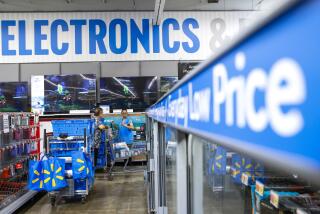Auto sales are sluggish in July but inch up slightly
- Share via
Add sluggish auto sales to the malaise that’s taking hold of the economy.
Sales of cars and trucks in the U.S. inched up less than 1% to about 1.1 million vehicles in July compared with the same month a year earlier. The sales rate was far below the 11% growth the industry has seen through the first seven months of this year, according to Autodata Corp.
The federal debt ceiling debate, higher car prices and spot inventory shortages, especially of Japanese brands and small, fuel-efficient cars, hurt sales, analysts said.
“The auto industry is having a difficult time shaking off adversity,” said Jeff Schuster, an analyst at J.D. Power and Associates.
And it wasn’t just automakers. Investors fled the stock market as new data showed consumer spending in June slipped 0.2%, the first decline since September 2009.
The Dow Jones industrial average tumbled 265.87 points, or more than 2%, to 11,866.62. The S&P 500 turned negative for the year, falling 2.6% to 1,254.05.
Commerce Department data showed consumers were avoiding big-ticket items such as appliances and cars.
Analysts said consumers were tightfisted in July as many scaled back spending, worried about the uncertain outcome of the rancorous debate between the Obama administration and the Republican-controlled House of Representatives over the federal debt ceiling limit. Consumer confidence also took a hit because of the lack of job growth in the economy, according to industry executives and analysts.
“With all the economic talk, people might have been a bit scared to go out and buy a car,” said Jessica Caldwell, an analyst with Edmunds.com, the auto information company. “The environment has not been very positive for car-buying right now.”
The slow pace of auto sales is a reversal from the torrid sales rate of the first months of 2011. Some in the industry are now questioning whether sales will reach the 13-million mark for annual sales previously estimated by most analysts and automakers.
Toyota Motor Corp. had forecast industry sales of 12.5 million for the year, at the low end of most projections. But to get there, the industry will have to raise its sales pace by at least 100,000 vehicles a month, or about 10%, through the balance of the year, said Jeff Bracken, a Toyota vice president.
General Motors Co. said it was leaning to a number closer to 13 million than the high end of its previous estimate, 13.5 million.
The industry is hoping for a rebound in the coming months.
“There are people who put off vehicle purchases because of uncertainty about fuel prices, vehicle availability and the economy. As these conditions improve in the latter half of this year, many of these buyers will return to the market,” said Don Johnson, General Motors’ U.S. sales chief.
Higher prices might be another factor holding back sales, said Brian Johnson, an analyst with Barclays Capital.
Auto information company TrueCar.com estimated that the average transaction price for light vehicles in the United States was $29,761 in July 2011, up $582, or 2%, from last July, and up $102, or 0.3%, in the last month. It was the highest average transaction price TrueCar has seen, said Jesse Toprak, an analyst with the company.
AutoNation Inc., which owns 254 new-vehicle franchises in 15 states, said last week that its average selling price for a new car in the second quarter rose $1,747, or 5.5%, from the year before to $33,703. Prices for used cars were up nearly 6%, or about $1,000 per vehicle, the nation’s largest dealership chain said.
The auto industry started off strong this year, with sales on pace to easily cross 13 million vehicles. But sales have slowed since the Japanese earthquake in March. The disaster upended auto production internationally by slashing the supply of auto parts needed to manufacture cars and shutting factories. That slashed the availability of many cars, especially Toyotas and Hondas, and dealers began to raise prices for most makes.
American Honda Motor Co. said its July sales fell 28.4% to 80,502 vehicles.
“We look forward to improved inventory levels in the coming months as most of our North American facilities begin to return to full production in August,” said John Mendel, executive vice president of sales for American Honda.
Toyota Motor Corp. said its July sales fell 22.7% to 130,802 vehicles, while Subaru sales fell 9.4% to 21,730 vehicles. Nissan North America said its sales rose just 2.7% to 84,601 vehicles.
Other automakers posted better results.
Sales at General Motors rose 7.7% to 214,915 vehicles compared with the same month a year earlier. Ford Motor Co.’s July sales totaled 180,315, up 8.7% from the same month a year earlier, according to Autodata Corp.
Chrysler Group posted a 20.1% increase to 112,026 vehicles. It was the automaker’s best July since 2007 despite a sales environment “tougher than a cheap steak,” said Reid Bigland, chief executive of Chrysler’s Dodge brand.
Automakers may launch a discounting war to get shoppers back to the showrooms. The move could help consumers but hurt the auto industry, said John F. Hoffecker, who heads the automotive practice at consulting firm AlixPartners.
“The key to continuing strong profits for the manufacturers will be to maintain incentive and inventory discipline,” he said.
More to Read
Inside the business of entertainment
The Wide Shot brings you news, analysis and insights on everything from streaming wars to production — and what it all means for the future.
You may occasionally receive promotional content from the Los Angeles Times.











